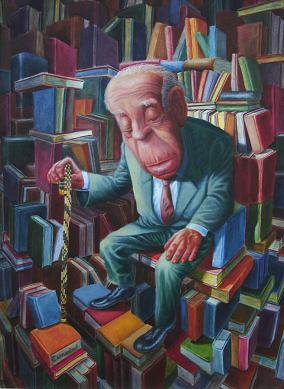
Jorge Luis Borges
Imagine a library, made of several rooms identical each other.
Every room is an hexagon. On five of the six walls there are five shelves, each one of those contains exactly 32 books, apparently not organized under any order. So, the total is of 5*5*32 = 800 books every room.
In the middle of the hexagon there is a big mouth for air circulation, bordered with a parapet, that makes the room look more like a balcony. At the lower and higher floor there are rooms identical to this.
In the sixth wall there are the accesses: one door for the bathroom, one for a room where you can rest, one passageway that bring to a room exactly equal at the same floor and one spiral stairway that turn around the room and allows to change level.
Which one of the six is the side of the accesses is potentially different each floor. If for example in one room the access is the western wall, at the upper floor it could be the one at east.
People that live in this library did never see the level ground nor the last floor or the most eastern or western room. Several philosophies has developed for this fact. Some believe in an infinity of rooms, others instead assume a starting point and an end, anyway all focused to the solution of the problem about what is outside the library. It is obvious infact that from the library one cannot go out. The inhabitants of the library infact get birth, grow, get old and die in the library.
The details on the life in the library can be omitted. Just as example, the first questions i asked myself, reading the book, were:
- where do they find food and water to drink? - in the story there is no mention about this problem.
- where do they throw the trash (and the dead people)? - for this it looks like they use the air well. The book describes the high number of suicides, for example, of people that throw theirselves in the deep after the parapet. It's not clear anyway how it is possible that there is not a huge flow of dead bodies and trash coming from the upper floors. Maybe this flow has not been described because not really nice to see.
Also the books, as it is for the library rooms, have a fixed format. Every volume is made exactly of 410 pages, each one of which contains 40 lines, each one made of 40 charactrs. A book, so, can be considered as a sequence of 40*40*410 (=656000) characters. On the spine of the book cover there are some writings, but, atleast by apparence, unrelated to the context of the book itself.
Finally, also the alphabet used for the things written in the book is strictly determined: the available characters are infact 25, including the blank space. Why exactly 25? Well, i imagine that Borges, since he's from Argentina, considered the Spanish alphabet, with which he could write any word, supposing to write numbers in words.
It's clear that a sequence of letters and blanks is equivalent to a sequence of words. And a sequence of words is a story that can be contained in a book in that format. I thought that the limited length of the book doesn't affect the possibility to contain one entire story, because if the story was shorter that 656000 letters, one could imagine the last pages filled with blanks, if it was longer further volumes could be assumed to contain the continuation.
Such a format is enough to contain any story that has ever been written or will ever been written in the future. But it is also up to represent sequences of words without a meaning, as in "aslkhjgop owi lkj fkjhd apoig poi pkj asdlhj glkfj". With no meaning or with a meaning in a different existing language, or in some language that does not exist yet, or that existed in the past. Or a summary of typing error on a sentence with a real meaning.
If the library would contain once all the possible books in this format, it should contain 25
656000 of them... I spare you the calculations, the result is a little less than 4.5*10
917048, which, in words, is "450 billions of billions o billions..." with the word "billions" repeated 101894 times.
Dividing for the number (800) of the books per room, we obtain the number of the needed rooms in the library, which is clearly a number dreadfully big too. so much that, if compared to the capability of a human, it looks practically infinite.
It is evident that, having such a number of books available, the probability to run exactly into that one that someone is looking for is practically zero. But not only! Practically zero is also just the probability to run into a book that has any meaning, or simply that contains some meaningful sentences hidden in a motley collection of apparently random characters.
Life in the library is all turned to find a sense of it, which is to find a meaning in books, to give a semanthics, or atleast a syntax to a grammatical sequence.
Some tendencies of thought were born in the Library. Particularily fascinating i found the one of those people that refuse the alienation of the books, and throw, as a demonstration act, big amount of them in the well down the parapet. Someone asserts that it is a sacrilege, because it can happen that a book with some meaning is among the books destroyed in that way, but others don't worry too much, because they assert that for any destroyed meaningful book, there are, left in the library, other billions and billions of books that differ only for few letters, as if there was some typing error that do not jeopardize the meaning.
Another interesting philosophy is the one that believes the existence of different rooms or books, that do not foolow the defined rules.
There's infact who spends the entire life looking for a catalog, which is a particular book that explains eventual rules of organization of the other books, and helps them to find any other significant book.
Or that there's a room, instead of hexagonal, circular, instead of books lined up next to each other on the shelters, it contained one only huge book, leaned to the only circular wall. Such a book would have a circular spine but no cover. It would contain the meaning of the Library, but it would be impossible to take it out from the shelter in order to consult it.
This is somehow the resumé, stuffed with interpretations of mine, of "The Library Of Babel", one of the 14 short stories (8 in the first part, 6 in the second), that form the book Ficciones.
It's the one i liked better, for the unreality and simplicity of the paradox, but also for the concrete description of the human anguish, always in a search of a meaning, just like us, real men and women in a real but sometimes incomprehensible world, in the perpetual search of a meaning, whichever it would be, that give a sense to our being in the world.
I found the reading of these stories easy enough, fluent and intriguing, even if, reading somebody else's comments, it assumes a deep knowledge (that i don't have) of the work of some philosophers.
Thanks to charlesblake for the picture i stole






 -
The wine menu must offer atleast 30 labels from the region.
-
The wine menu must offer atleast 30 labels from the region.



